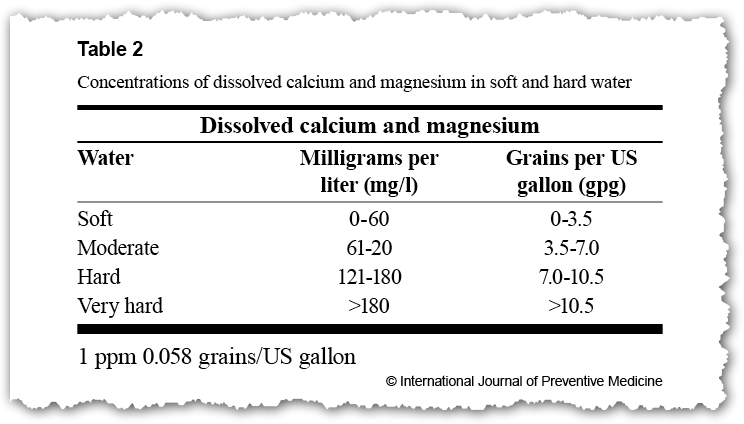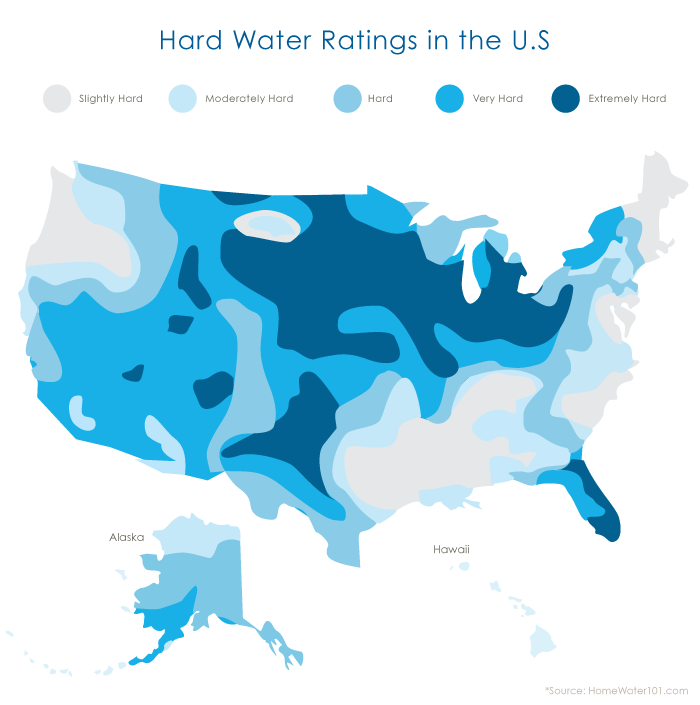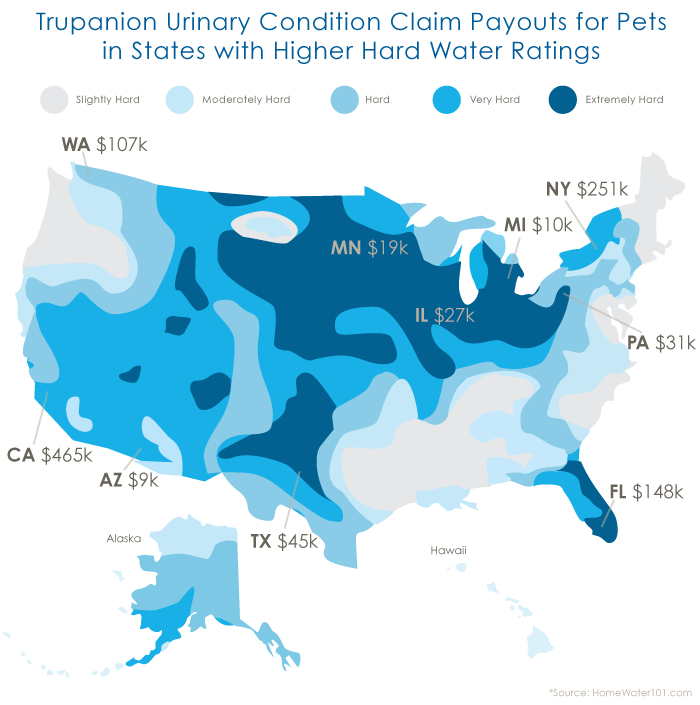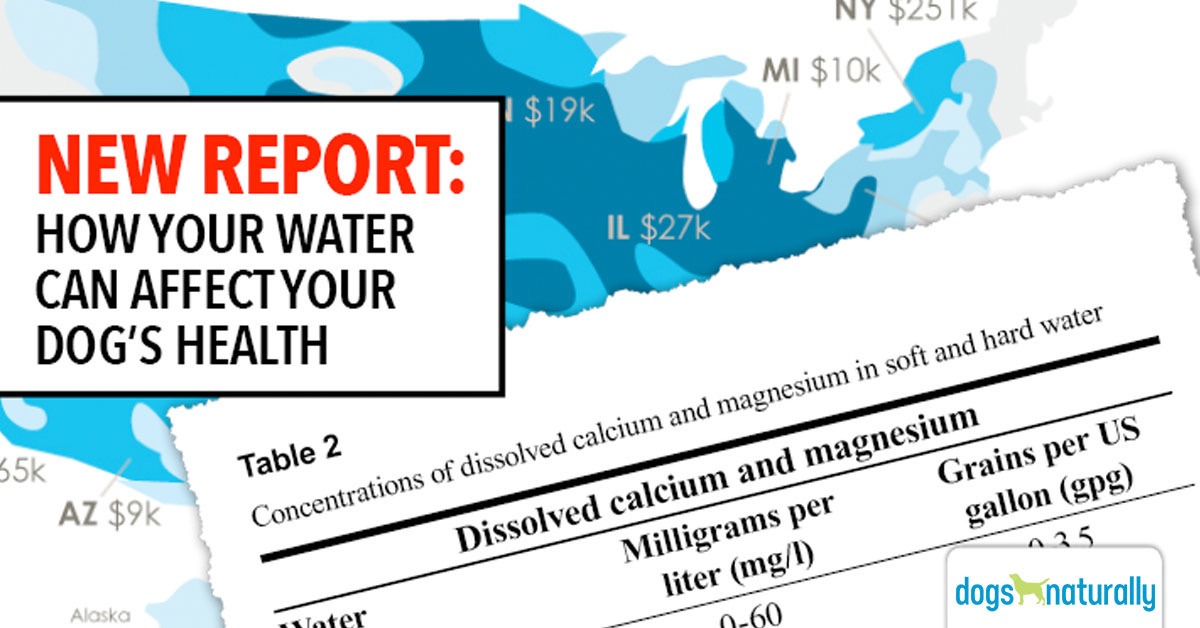What’s in your dog’s water bowl?
If you’re giving your dog straight, untreated tap water to drink, it could affect her health …
… especially if she’s prone to urinary issues.
A recent study by veterinary medical insurance company Trupanion suggests there could be a direct link between hard water and urinary health issues in pets.
What Is Hard Water?
Hard water is water with a high mineral content. These minerals are usually calcium and magnesium.
The following chart from the International Journal of Preventive Medicine shows the difference in mineral content between hard and soft water.

The main minerals causing hard water are calcium and magnesium. Calcium and magnesium are minerals that are important to your dog’s health … so you may wonder what the problem is.
Is Hard Water Good Or Bad?
There’s been controversy about hard water for years and it gets really confusing if you try to research it online.
Over the years, experts have raised concerns about hard water and its impact on a variety of health issues including heart disease, fertility, Alzheimer’s disease, digestive issues and eczema.
Many formal studies just find that the evidence is inconclusive. This is partly because it’s really hard to isolate water from other factors that influence health, so scientists are reluctant to say that hard water itself causes (or prevents) disease.
A report on Hardness in Drinking Water by the World Health Organization (WHO) concludes that hard water doesn’t adversely affect health, and that the magnesium in hard water may even “have a protective effect on cardiovascular mortality.”
Some articles say hard water is neither harmful nor helpful … but it’s a nuisance because the minerals can build up in your plumbing, it prevents shampoos and soaps from lathering and makes your clothes stiff when you wash them in it!
Most holistic vets recommend giving your dog filtered or bottled water rather than straight tap water, but that’s primarily to avoid chemicals like fluoride that can be very damaging to your dog’s health.
But now, Trupanion has done some analysis that shows there may be a correlation between hard water and urinary health issues in pets.
About The Study
It started when Trupanion noticed they were paying a high amount of medical claims for urinary issues in both cats and dogs. Cats are particularly prone to these issues, with 40% higher probability of urinary issues than dogs.
But dogs also suffer from urinary ailments so this is important information for you as a dog owner too.
When their in-house vets suggested that drinking water could be a factor in urinary illness, and especially crystalluria (crystals in the urine), Trupanion decided to dig a little deeper into their data.
So they mapped out hard water areas across the US, then mapped out their medical payments for urinary issues and compared the two.
Water hardness is expressed in grains of calcium carbonate per gallon (gpg), which is 1 grain (64.8 mg) of calcium carbonate dissolved in 1 US gallon of water.
The Environmental Protection Agency (EPA) ratings for hard water are:
Extremely Hard: Greater than 14 gpg
Very Hard: 10 to 14 gpg
Hard: 7 to 10 gpg
Moderately Hard: 3 to 7 gpg
Slightly Hard: Less than 3 gpg
Here are Trupanion’s maps showing the results.
This first map shows the hard water areas across the US.

Local water authorities are required to provide annual reports on water quality and chemical analysis. If you don’t know whether you have hard water or not, you can contact your local water supplier for the information.
The second map shows Trupanion’s claim payments for urinary conditions, overlaid across the hard water areas.

The map shows that claim payments are high in areas such as Florida, Illinois, parts of Texas and Michigan. Payments in California were extremely high, at $465,000.
Other cities with “extremely hard” water include Miami, Chicago, Minneapolis, Detroit and Cincinnati.
Trupanion’s study concluded that in areas with extremely hard water ratings, cats – and especially male cats – were three times more likely to have urinary complications, especially crystalluria, than male cats in areas with water ratings of slightly hard, hard or very hard. The areas with most incidence were Santa Cruz and Thousand Oaks, CA, Springfield, MA, Long Island NY, Baltimore MD, Tampa FL and West Palm Beach FL.
While the rates of urinary issues in dogs are lower than in cats, dogs are not immune from these problems.
Urinary Health Issues
Dogs can often suffer from problems like urinary tract infections, incontinence, cystitis and crystalluria.
Female dogs are 2.5 times more likely than males to experience these illnesses.
Crystalluria – crystals in the urine – is the primary condition that Trupanion found can be aggravated by hard water.
While crystals in the urine don’t necessarily lead to kidney stones, they can sometimes be a warning sign that your dog may be at increased risk for struvite or calcium oxalate stones (the two most common types of stones in dogs).
Crystals can also irritate the bladder wall and lead to bladder or urinary tract infections.
According to Traditional Chinese Veterinary Medicine (TCVM) expert Dr Chris Bessent, dietary magnesium can be a contributor to the formation of crystals and struvite stones.
So it makes sense that high magnesium in hard water could increase the likelihood of your dog getting painful urinary crystals.
If you live in a hard water area, what should you do?
Avoiding Hard Water For Your Dog
Since most holistic vets recommend not giving dogs tap water because of chemicals like fluoride or chlorine and contaminants like heavy metals, the easy solution to avoiding hard water as well as other toxins is to give your dog filtered or bottled water.
If you opt to use bottled water for your dog, check your source carefully and do your research on the brand you choose. Some bottled waters have been found to contain chemicals and other contaminants.
A good place to start your research is with the Environmental Working Group’s (EWG) Bottled Water Scorecard 2011. Even though it isn’t completely up to date, EWG says that not much has changed since they published this report.
You can also buy water softening systems. These systems usually increase sodium in the water, while lowering the levels of calcium and magnesium.
Softening systems don’t remove other contaminants from the water. They work via a flushing or backwashing cycle that uses a lot of water and releases brine into the environment; some communities have banned them because of this.
Reverse osmosis filters may be a better way to eliminate contaminants as well as soften water.
Reverse osmosis units force water through a semi-permeable membrane under pressure, leaving contaminants and minerals behind. However, they are wasteful because they use approximately three times as much water as they treat.
There are also steps you can take to help protect your dog from urinary issues.
Herbs To Prevent Urinary Disease
Dr Chris Bessent recommends a variety of Chinese herbs to maintain bladder health. If you’d like to use any of these herbs, assume the dosing directions are for a 150 lb person and adjust for your dog’s weight.
Akebia is a flowering plant known for its draining and cooling abilities. It aids in eliminating damp heat from the bladder and promotes healthy urination.
Plantago seed promotes healthy bladder function and drain damp heat.
Rhubarb root is known for its natural ability to empty the system of waste. Its fiber content supports colon function along with healthy bowel movements.
Another supportive Chinese herb is rush pith. Besides clearing heat from different areas of the body, rush pith is a mild diuretic, which is especially helpful in treating painful dribbling.
Cranberries acidify the urine, making it an unfavorable environment for most types of bacteria to survive in. Cranberries can also attach to bacteria and prevent them from attaching to the bladder wall. Cranberries also contain salicylic acid, a natural anti-inflammatory.
D-mannose is a simple sugar that works similarly to cranberries by decreasing bacteria’s ability to stick to the bladder wall.
Dr Bessent also recommends you avoid feeding your dog grain carbohydrates which are high in magnesium.
A meat based diet, which is low in magnesium, promotes healthy bladder and urinary function.
Read more about bladder and urinary tract health in this article by Dr Bessent.
There’s still more research to be done before the effects of hard water on your dog’s health (and yours) are fully known.
But this new information from Trupanion suggests you should be cautious about what your dog drinks until more definitive information is available.












